Organ donation in China has a face of self-deception
The original text was written on September 5, 2019.
1. Bizarre organ donation
The story in the first chapter has more detailed details in three reports by The Paper, The Beijing News and Southern Weekly.
1. https://baijiahao.baidu.com/s?id=1641792837307301171&wfr=spider&for=pc
2. https://m.bjnews.com.cn/detail/156677883515729.html?from=singlemessage&isappinstalled=0)
3. https://finance.sina.com.cn/roll/2019-08-29/doc-iicezueu2034808.shtml
1.
Shi Xianglin is an ordinary resident of Huaiyuan County, Bengbu, Anhui Province, but since February 10 last year, unfortunate incidents happened to him one after another.
That day, he had a violent argument on the phone with his schizophrenic biological brother. In a fit of rage, the elder brother swung an ax and chopped up the three members of Shi Xianglin's family and their 53-year-old mother Li Ping.
All four were taken to the hospital. Shi Xianglin's cousin rushed over to take care of the three members of the Shi family; his mother, Li Ping, was taken care of by his father and younger sister.
Five days later, when he was still lying unconscious on the hospital bed, another intensive care unit, his mother's attending physician Yang Suxun announced that Li Ping "resuscitated and on the verge of brain death."
Dr. Yang told Shi Xianglin's father and sister, "She is still in a vegetable state after being cured." It is better to donate Li Ping's organs and get a subsidy of 160,000 yuan.
His father and sister have no objection to organ donation, but they are not satisfied with the 160,000 yuan. After some bargaining, they agreed to donate their organs, filled out a Chinese organ donation registration form, and then received a transfer of 200,000 yuan from an account called "Huang Chaoyang".

Soon after, Shi Xianglin was discharged from the hospital and went to a forensic doctor for an appraisal of his injuries. This forensic doctor also happened to help Li Ping perform an autopsy before. He inadvertently asked Shi, "Your mother sold her organs to the county hospital. How much will the county hospital give you?"
Shi was taken aback, what? My mother's organs were sold?
The judge said that the autopsy report stated, "The liver is absent, and the stump is sutured; both kidneys are absent, and the stump is sutured."
He immediately went home and questioned his father and sister. After confirming that it was true, he quickly contacted his mother's doctor, Yang Suxun, and asked Yang to provide all the information on organ donation. Dr. Yang sent him four photos, one of which was this Chinese organ donation registration form.
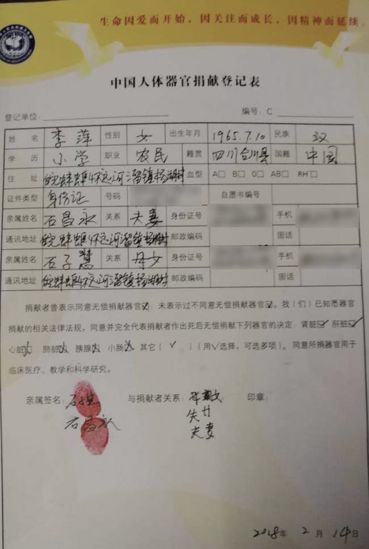
On this form, the signatures, fingerprints, and payment date of his father and sister were all intact, which seemed to prove that Li Ping's donation of two kidneys and one liver was justified.
But he took a closer look and found doubts: Why are the registration unit and number blank, and there is no official seal?
He secretly made up his mind to investigate this matter to the bottom.
2.
Three months later, he went to Beijing with this organ donation registration form, and found the organization that manages organ donation— China Human Organ Donation Management Center.
The China Human Organ Donation Management Center, affiliated to the Red Cross Society of China, is responsible for the publicity and mobilization of human organ donation, registration, donation testimony, rescue incentives and other related work.
The center inquired about an Internet called "China Computer System for Human Organ Allocation and Sharing" (COTRS). , impartial, and free from human intervention in the allocation of donor organs".
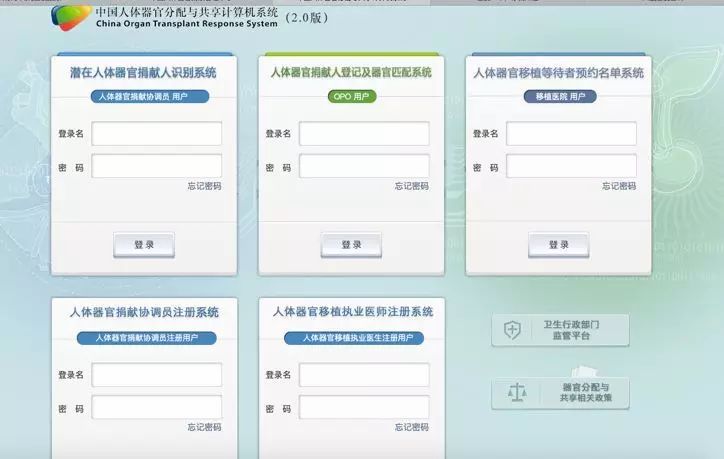
The China Human Organ Center entered Li Ping's name into the system, clicked search, and the system showed that there was no such person.
Shi Xianglin was dumbfounded. The China Human Organ Center explained that this showed that Li Ping's organ donation was not done by the Red Cross, that is, it was not donated through formal channels, "it was a doctor's personal behavior."
According to the meaning of the Red Cross Society, this is a fraudulent donation case led by a doctor.
3.
Shi Xianglin took the results issued by the organ management center and sued Yang Suxun to the Health Commission.
At this time, Yang Suxun was worried that Dong Chuang's incident would happen, so he found Shi Xianglin and proposed to use money for private affairs.
After some bargaining, Dr. Yang's wife took the 460,000 cash from the sale of the house and handed it to Shi Xianglin face to face.
Just when everything was about to calm down, the Health Commission came that afternoon.
They found Shi Xianglin and learned about the case.
Shi also told all the details of this matter, and even the private chat about collecting money. The Health and Medical Commission said that we only care about the facts of the case, and we don't care about private matters.
A few months have passed, and the New Year is approaching. When every family is saying goodbye to the old year and welcoming the new year happily, Shi Xianglin received a call from the Health and Medical Commission, and his heart was as cold as ice.
The Health Commission told him that Yang Suxun had been punished by revoking his business license.
In his view, this punishment is obviously too light, "you know, this is a criminal offense with a complete industrial chain."
So he sued Yang Suxun to the Huaiyuan Public Security Bureau. But the police refused to file a case.
He didn't give up, and the police didn't budge. They argued many times, but nothing came of it.
4.
In April 2019, Shi Xianglin learned that the Central Anti-Corruption Special Supervision Team had come to Bengbu, so he went to try his luck. As a result, Huaiyuan police arrested six suspects a few days later. Among the six suspects, some are from Jiangsu and some are from Anhui.
One month later, the case entered the investigation stage, and the Huaiyuan police transferred the six suspects for review and arrest. The charges were initially determined to be "suspected of insulting the corpse."
But Shi Xianglin was still unhappy. Where are these doctors just insulting corpses? If there is no buying and selling of organs, how can doctors give him so much money? Isn't this "organizing others to sell human organs"?
In China, the maximum sentence for "insulting a corpse" is three years, while "organizing others to sell human organs" is five years. However, in the past judgment documents, there is no case of "organizing the crime of buying and selling human organs" involving the buying and selling of organs from remains, and all of them are illegal trading of living organs.
Then, whether Li Ping really died during the organ transplantation is very important.
It is reported that not only the attending doctor Yang Suxun was present at the time of Li Ping's death determination, but another doctor Zhang was also involved. The final diagnosis of death was also written in the medical record by Dr. Zhang. Therefore, there is a high probability that Li Ping's body extraction operation was performed after death. It is difficult for these six criminal suspects to be identified as the crime of organizing the sale of human organs.
5.
At this point, the story reached its climax— where did Li Ping's organs go?
The clues were discovered by careful reporters from Li Ping's autopsy report.
That day, the forensic doctor performed an autopsy on Li Ping, but accidentally discovered the absence of liver and kidney.
He inquired about the situation from "relevant departments" who could not reveal his identity.
Subsequently, the department sent a witness record of organ procurement and two pathological examination reports, and asked the forensic doctor to enter these three materials into Li Ping's autopsy report. The forensic doctor complied.
The organ procurement witness record is usually issued by the Red Cross; and the pathology record is issued by the recipient hospital five days after the transplant operation.
According to the organ procurement witness records, Li Ping’s organs were taken away on the day of her death, and the place where the body was taken was the 302nd Hospital of the People’s Liberation Army;
Pathological records show that the kidney transplant was performed at Tianjin No. 1 Central People's Hospital, and the liver transplant was performed at the 302nd Hospital of the People's Liberation Army.
These two hospitals are well-known transplant hospitals in the country. And the 302 hospital has a military background.
But when the reporter interviewed the 302 Hospital, 302 said that there had never been a pathology report of Li Ping;
The system of Tianjin First Central People's Hospital did detect Li Ping's report, which even included the name of the doctor and the date it was issued. But the doctor who issued the report was not the transplant doctor, so it was impossible to trace who performed the transplant.
So until now, how the organs arrived at these two hospitals, who was the final recipient of the organs, and who performed the operation are still a mystery.
The story ends here. But this matter is full of doubts, and it is extremely frightening to think about it carefully.
What kind of person is able to mobilize manpower and resources in Anhui, Jiangsu, Tianjin, Beijing, and even the capital?
From the body extraction to the completion of the transplant operation, the time spent has never exceeded 24 hours. Is there a complete industrial chain behind this?
How does China's organ donation and transplantation system work? What existing shortcomings of these systems have been exposed by this incident?
2. The road to whitewashing
1.
In February 2017, on a peaceful afternoon, my mobile phone suddenly received a news push: "Huang Jiefu was invited to the Vatican to attend the Anti-Organ Trafficking Summit".
I was shocked at the time.
Who is Huang Jiefu? Former Vice Minister of Health, current Deputy Director of the Central Health Care Commission, member of the Standing Committee of the Chinese People's Political Consultative Conference, chairman of the China Human Organ Donation and Transplantation Committee, chairman of the China Organ Transplantation Development Foundation, and more generally, the number one chair in the transplantation industry in China.
Huang Jiefu's invitation to participate in the anti-organ trafficking summit at least shows one thing, even if there are voices of opposition, the international community generally recognizes China's organ transplantation cause. If I remember correctly, this is the first time that China has been invited to attend a summit in the field of organ transplantation organized by an authoritative international organization.
You must know that because of China's long-term dependence on executed prisoners as donors for organ transplants, and some unexplainable reasons, the Chinese transplant community has long been cast aside by the international transplant industry.
In 2011, "The Lancet" published an article calling on the international community to implement the "three noes" policy against China , denying its clinical transplant results, not allowing clinical organ transplant articles to be published in international authoritative journals, and not allowing Chinese transplant experts to join the world transplant Association 【1】.
In the same year, in response to this appeal, Huang Jiefu also published an article in The Lancet titled "China's Organ Donation in Fumble". Instead of denial, ignorance and non-recognition of the three-strike international speaking norm, this article directly confronts the controversy, frankly stating that about 65% of the organs needed for organ transplantation in China come from the deceased, and more than 90% of them are provided by executed prisoners, and China is the only one Countries that systematically use executed prisoners' organs in transplant operations [2] .
However, the point of this article is not to admit mistakes, but to declare to the world the determination to change.
In March 2007, the State Council promulgated the "Regulations on Human Organ Transplantation". In 2009, citizens' donations began to be prepared, started in 2010, and rolled out to the whole country in 2012. On September 1, 2013, the "Regulations on the Administration of Human Donated Organs Acquisition and Distribution (Trial) "Formally implemented. This regulation led to the birth of the Organ Procurement Organization (OPO) , and the mandatory implementation of the " China Organ Transplant Response System (COTRS)" in 165 hospitals qualified for organ transplantation【3 】. In March 2014, the Human Organ Procurement Organization Alliance of the Chinese Hospital Association (ie, the OPO Alliance) was established in Guangzhou.
In less than a year, on January 1, 2015, the official announced that China had completely stopped using the organs of executed criminals as a source of donors, and voluntary organ donation after the death of citizens has become the only channel for organ transplantation [4].
In October 2015, at the Global Organ Donation and Transplantation Conference held in Seoul, South Korea, China officially joined the International Organization for Organ Transplantation, marking the end of the international community's "three noes" policy towards China.
In 2017, Huang Jiefu was invited to participate in an international conference, and organ donation and transplantation in China were officially whitewashed.
2.
What exactly are the Human Organ Procurement Organization (OPO) and the Chinese Computer System for Organ Transplant Allocation and Sharing (COTRS)? Why can their establishment quickly cleanse China's organ donation and transplantation?
Before answering this question, we have to clarify the whole process of organ donation and transplantation.
To complete a complete organ donation and transplantation, there are four steps: organ donation, organ procurement, organ allocation, and organ transplantation.
We start with organ donation.
At present, organ donation in China is mainly in charge of the Red Cross Society. Its management agency is the China Organ Donation Management Center, and human organ donation offices have been set up in various provinces. The main members of the office are the OPO coordinators of the Red Cross Society .
The OPO coordinator of the Red Cross Society, also known as the human organ social work coordinator, their main job is to publicize and mobilize and witness the donation.
Propaganda and mobilization is very common in life, various promotional films that incite people to tears and encourage more people to donate organs.
Donation witness is to witness the entire organ removal process, and this step is related to the downstream of the process.
3.
In the whole process from organ donation to transplantation, the Red Society does not have much power. The one with the real power is the mysterious "Organ Procurement Organization" OPO (Organ Procurement Organization), which has been mentioned many times before.
"OPO is a professional organization engaged in organ donation approved and registered by the provincial health administrative department", what does it mean?
In fact, it is a hospital that meets the conditions of the provincial health administrative department. An OPO system is established in the hospital that is independent of the organ transplantation department. The disease assessment and donor maintenance working group, the donor or organ transportation working group, and the human organ quality assessment and acquisition working group are composed of different professional groups [5].
It's okay if you don't remember any of these. But you must remember that in this OPO, the most important staff is also called the organ coordinator , but this time it is not the "Red Cross OPO Coordinator", but the "Hospital OPO Coordinator".
The responsibilities of a hospital OPO coordinator and a Red Cross OPO coordinator are very different. After the patient showed symptoms of brain death, the OPO coordinator of the hospital contacted the family members and advised them to donate their organs. After the family members agree, the OPO coordinator of the hospital will then contact the OPO coordinator of the Red Cross Society to come to the hospital to witness the whole body extraction process, which is the function of "donation witness" mentioned above.
At this time, the OPO coordinator of the hospital needs to quickly arrange doctors, nurses, and examiners to evaluate the organ function status of the deceased to be donated, and determine the suitable organs for donation; The coordinator needs to witness the whole process, record the time and place of body extraction, and form the "organ donation witness record" mentioned in the above news.
At this point, the work of the Red Cross OPO coordinator is basically over, but the hospital OPO coordinator is also responsible for the subsequent organ allocation, escorting the organ to the transplant hospital after allocation, and witnessing the transplant hospital performing implant surgery. In short, the hospital OPO coordinator The staff ran through the whole process from donation to transplantation.
Furthermore, hospital OPO coordinators and Red Cross OPO coordinators belong to different organizations. The OPO office where the hospital OPO coordinator is located is not under the management of the Red Cross, but under the management of the hospital. The OPO offices across the country have formed the OPO Alliance of the Chinese Hospital Association and the China Organ Transplantation Development Foundation, commonly known as the "China Organ Procurement and Distribution Expert Committee", which is supervised by the Ministry of Health. To put it bluntly, it is a government agency with a strong root.
4.
To sum up, the most formal donation and body extraction process should be:
step1: The donor's attending doctor declares the patient's death, (Note: The body harvesting doctor cannot declare the patient's death, the patient's death can only be announced by the donor's attending doctor);
Step2: The hospital notifies the OPO coordinator of the hospital to persuade the family members;
step3: The family members agree to donate the deceased's organs;
step4: The Red Cross OPO coordinator intervenes;
step5: After the attending doctor leaves, the OPO coordinator of the hospital will contact the body taking doctor, anesthesiologist and other professional team members to take the body; the OPO coordinator of the Red Cross will witness the whole body taking process;
Step6: The OPO coordinator of the Red Cross issue the "Organ Donation Record Form";
step7: The body extraction work is completed.
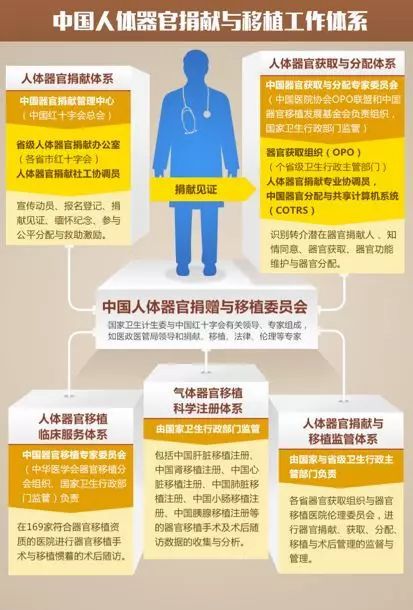
5.
After the body extraction is completed, there is a more critical step, organ distribution.
At this time, the leading group of the hospital's OPO office is responsible for entering the relevant information of the deceased into the "China Human Organ Allocation and Sharing System", or COTRS for short, and the system automatically allocates the deceased according to the severity of the patient's condition and other relevant information.
That's why the government has made COTRS mandatory in 165 hospitals that qualify for organ transplants.
The government hopes that all distribution will be done by the system, and no institution, organization or individual may distribute donated organs outside the organ distribution system without authorization, so as to ensure the traceability of donated organs and the fairness of organ distribution.
Taking liver transplantation as an example, after entering the list of all liver transplant candidates, the system will generate an orderly list of patients waiting for liver transplantation according to the system allocation rules. According to the "Notice on Printing and Distributing the Basic Principles and Core Policies of Human Organ Distribution and Sharing in China" [6], the following seven principles affect the ranking rules: medical emergency score, geographical factor, age factor, blood type matching, and organ after death. Donation, living liver donation, liver transplant waiting time, and finally each patient gets a score according to their own situation. The higher the score, the higher the system ranking and the greater the chance of getting a donor.
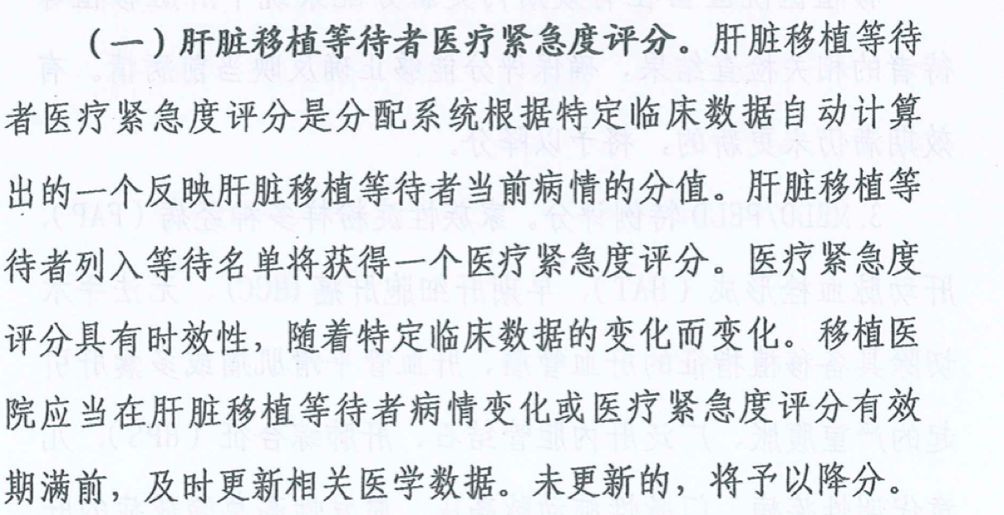
6.
After the allocation is completed, the OPO coordinator of the hospital, according to the allocation results of the sharing system, carries the organ acceptance confirmation letter, transports the organs to the operating room, and hands them over to the doctors and nurses in charge of transplantation.
Ultimately, doctors at the transplant hospital perform the transplant on the patient. After the transplant operation is completed, OPO also needs to further register the result feedback on the system and do the final information entry work.
Because China currently prohibits the donor and the recipient from knowing each other's information, the so-called "double-blind system", so the OPO, as the person who knows the most information, is also responsible for the human organ donors, recipients and applicants. The personal data of patients undergoing organ transplantation are kept confidential.
At this point, the hospital's OPO work is over, and the entire organ donation and transplantation process is also completed.
Three, doubtful
1.
The above system looks very complicated. To put it bluntly, it separates the four steps of organ donation, organ procurement, organ distribution, and organ transplantation, and assigns them to different organizations to be responsible, thereby reducing the black-box operations in donation and transplantation.
Organ donation is the responsibility of the Red Cross.
Organ procurement is the responsibility of a separate OPO office in the organ harvesting hospital.
Organ allocation is done by machines without human intervention - the COTRS system takes care of it.
Organ transplantation is in charge of recipient hospitals (or transplant hospitals).
It seems that it is very open and transparent, but in fact, it is full of loopholes.
2.
Looking closely at this process, the two most critical steps are organ procurement and allocation, namely OPO and COTRS.
It is precisely because of the existence of OPO and COTRS that China has successfully gained the right to speak in the international transplantation field.
Unfortunately, the mechanism setting of hospital OPO and COTRS has natural defects.
First of all, the non-profit nature of the OPO organization is questionable [7].
As mentioned above, my country's current OPO is affiliated with a large general hospital that has the authority to carry out organ transplants, and is supervised and responsible by the national health department. It is not an independent public welfare organization.
Which hospitals can set up OPO offices? This standard is formulated by the Ministry of Health and government agencies. Among the more than 100 hospitals that meet the standards, at least 20% of them have military background.
Secondly, although the regulations require that the OPO office of the hospital must be independent from all other departments, that is, the doctors in the OPO office of the hospital can only perform body extraction operations, but cannot participate in treatment. The reality is that the person in charge of the OPO in the hospital is often a surgical expert, so they can not only diagnose your condition, but also identify your death, and finally take out your organs. With such a one-stop service, doctors have so much power, it's no wonder they don't commit crimes.
Furthermore, Chinese hospital OPO coordinators are basically responsible for the whole process of organ procurement, allocation and transplantation. Dereliction of duty in any of these links is the beginning of a crime. Under this system, the OPO coordinator of the hospital does not contact the OPO of the Red Cross Society, does not enter the donor information into the COTRS system, and colludes with the doctor. It is simply a breeze.
From this point of view, the above news, the occurrence of the case of fraudulent organ donation in Anhui, can be said to be inevitable under this system.
Finally, the COTRS system responsible for the allocation, is also very strange. What is the ranking of patients? How to calculate the details of the system allocation? How is the system programmed? Who can operate the system? Can the above information be deleted? What is the relationship between doctors and this system? These issues that extremely affect fairness and transparency are not detailed on the official website. According to the Beijing News, the situation of "jumping in line with money" happens from time to time.
The Beijing News report once mentioned related cases:
In a large public hospital, a reporter from the Beijing News saw Ma Gang (pseudonym), an inpatient who had just undergone liver transplantation, in the ward. Ma Gang told the Beijing News reporter, "There is a shortage of liver sources now. If you queue up normally, you will have to wait indefinitely."
Ma Gang said that in June this year, he privately slipped money to the surgeon who performed the surgery. He declined to disclose the exact amount, saying only "at least 50,000." Later, he quickly received a text message from the hospital saying "You have entered the waiting list", and he underwent a transplant operation in July. Ma Gang said, "After privately finding the chief surgeon and queuing up, the chief surgeon will ask other hospitals to help find liver sources, which are usually patients with car accidents or brain death."
In the final analysis, it is because both COTRS and OPO are under the jurisdiction of government departments, and there is no supervision group to supervise them. The administrative power is too large, and transparency cannot be achieved at all.
3.
For this reason, I went to the Lighthouse Country and looked at their organ donation system.
I seriously doubt that China's organ donation system is a complete copy of the system of the Lighthouse country, but unfortunately, it only copies the shape, not the spirit.
The United States also follows the four steps of organ donation, organ procurement, organ distribution, and organ transplantation, but each step is done in an aboveboard manner.
Organ donation: When Americans apply for a driver's license, they will fill out an organ donation form, or you can register on the official organ donation website under the HealthResources & Services Administration.
The address is: https://www.organdonor.gov/
Organ procurement: The OPO is also responsible for organ procurement in the United States, but this OPO is not established by a general hospital in the United States, but a separate department under OPTN (Organ Procurement and Transplantation Network).
OPTN is a public welfare neutral organization completely independent of the government, and is protected by the US National Organ Donation Act.
According to the division of regions, OPTN has established a total of 58 OPOs. The information, managers, phone numbers, and addresses of these OPOs can all be found online.
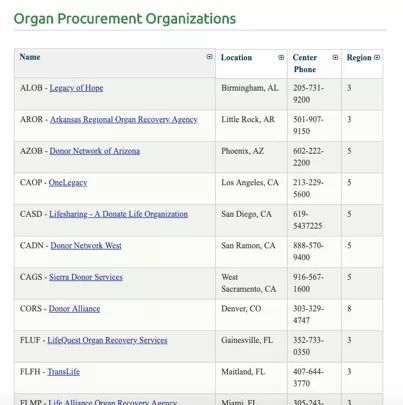
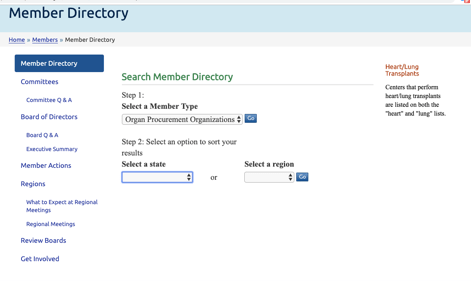
Compared with China, who can tell me why Beijing can not announce it?
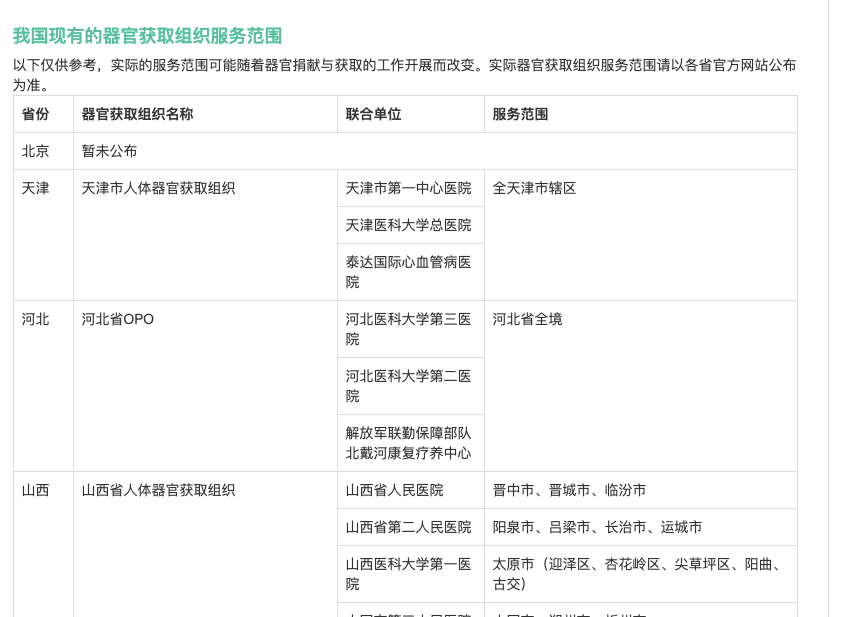
In addition, OPTN has a special team responsible for documenting and monitoring the organ procurement process, as well as conducting regular inspections of OPO and transplant centers. If the OPO and the transplant center have violated the regulations, they will no longer be able to participate in the work of organ allocation [9].
Organ allocation is carried out on UNOS (The United Network for Organ Sharing), which is actually COTRS in the United States. Unlike COTRS in China, which is under the jurisdiction of the Ministry of Health, OPTN in the United States is a private non-profit intermediary organization. It signed a contract with the government to conduct central supervision on organ procurement, distribution, and transplantation, and recorded all organ transplant operations in the United States. The data was fully disclosed to realize the authenticity and transparency of organ donation.
First, it allows patients to find information on organ donations across the country anytime, anywhere.

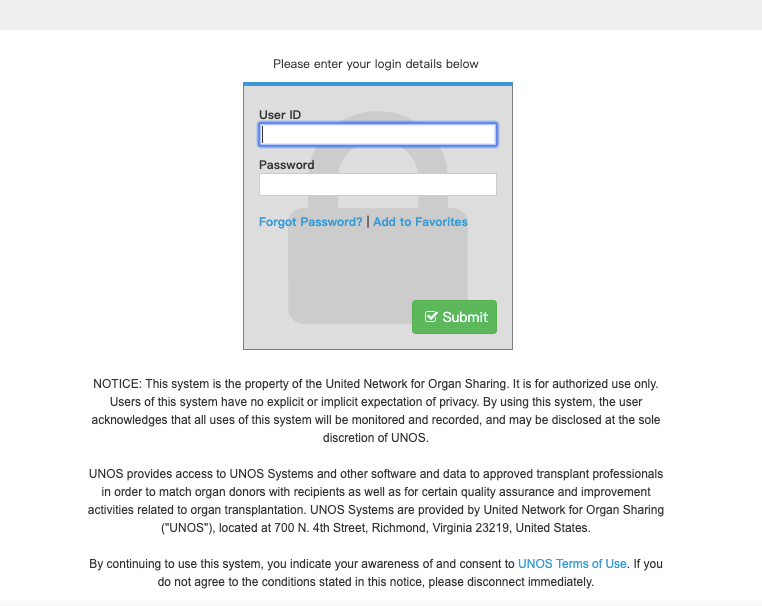
Secondly, it fully discloses the rules for ranking patients. On the website, enter your age and condition, and the system can immediately calculate your ranking and equivalence for you.
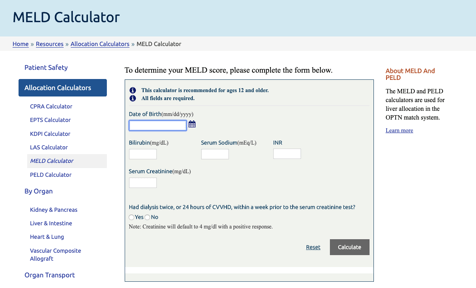
Everything is so transparent.
4.
China's organ transplant system has a face of self-deception.
In 2019, Matthew, Raymond & Jacob conducted a mathematical statistical analysis of all official Chinese (COTRS & Red Cross) data on organ donation and transplantation from 2010 to 2018, and found that almost all official data had Questions, contradict each other, suspected of fabrication.
For example, the annual number of organ donations and transplants in China from 2010 to 2018 is statistically the mathematical identity of the "R-squared statistic". What does that mean? Popular understanding means that the number of organ donations and transplants in China has increased this year compared to last year, and the growth ratio between last year and the year before has been exactly the same, and this situation has lasted for 8 years.
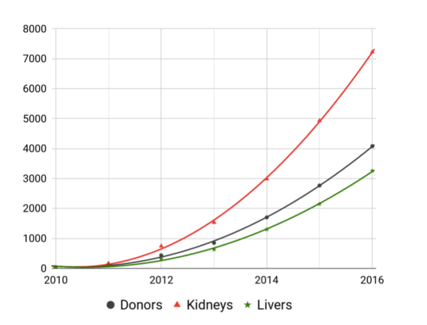
The author also analyzed such data from other countries and found that there is no country in the world where the value of donation and transplantation is exactly the R function. In order to ensure this kind of constant growth, it is necessary to ensure that the objective conditions of annual donation and transplantation converge. In the past 8 years, China’s organ donation system has been gradually established, and the situation will change a lot every year, and the willingness to donate itself is random. It is a very big thing, so the official data is hard to be convincing [10].
Secondly, on June 22, 2018, the National Health Commission held a special press conference. It was revealed at the meeting that a total of 4,732 liver transplants were performed in China in 2017, and the current average waiting time is 27.5 days, which is far less than that in the United States. 120 days【11】. However, the organ donation rate per million people in China was 3.72, while in the United States it was 27 per million people. With such a low donation rate, but the waiting time for transplant surgery is so short, where do the organs that can be used for surgery come from?

In addition to the problems of the system itself, there are still many imperfections in China's organ donation and transplantation, such as the dispute over the determination of brain death and heart death; Incentives specifically for organ donation, etc., will not be listed here. After all, if the core is the problem, treating the epidermis is mostly useless.
【Reference】
1. Caplan AL, Danovitch G, Shapiro M, et al. Time for a boycott of Chinese science and medicine pertaining to organ transplantation [J]. Lancet, 2011, 378 (9798):12
2. Huang, J. , Millis, JM , Mao, Y. , Millis, MA , Sang, X. , & Zhong,S. . (2012). A pilot program of organ donation after cardiac death in china. Lancet (North American Edition), 379(9818), 0-865.
3. https://news.qq.com/zt2016/qgyz/home.htm
4. Jiefu Huang. (2017). The "Chinese model" of organ donation and transplantation. Chinese Journal of Organ Transplantation, 38(03), 129-130.
5. Society of Organ Transplantation, Chinese Medical Association. (2018). Expert Consensus on Guiding Opinions on Construction of Hospital-level Human Organ Procurement Organizations (opo). Chinese Journal of Organ Transplantation, 39(3), 171-173.
7. Li Ze. (2014). Opo Alliance: Regulating Organ Procurement. Chinese Hospital Director (7), 40-40. http://www.doc88.com/p-2671293574809.html
8. Zhao Huijia, & Ye Qifa. (2018). The role of the joint network of organ sharing in organ donation and transplantation. Chinese Journal of Hepatobiliary Surgery, 24(10), 713-716.
9 Ye Ziyun, & Xiao Yanping. (2018). Several opinions on the improvement of China's organ donation legislation. Medicine and Philosophy (1), 72-76.
10. Matthew P. Robertson, Raymond L. Hinde, Jacob Lavee3 (2019), Analysis of official deceased organ donation data casts doubt on credibility of China's organ transplant reform,
11. http://www.jksb.com.cn/index.php?m=wap&a=show&catid=20&id=125966
13 Zhang Xiaoman, Feng Lei. (2019). Using psychological crisis intervention to alleviate the cultural sensitivity of organ donation in China. Organ Transplantation, 10(1), 84-87.
14 Miao Jia. Thoughts on Ethical, Legal and Social Issues of Organ Transplantation Sources[J]. Science and Society, 2012, 2(2): 106-115.
Like my work? Don't forget to support and clap, let me know that you are with me on the road of creation. Keep this enthusiasm together!

- Author
- More